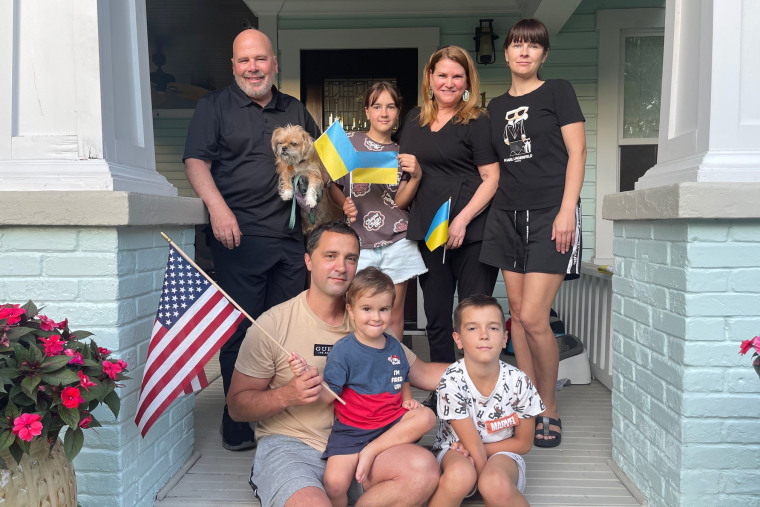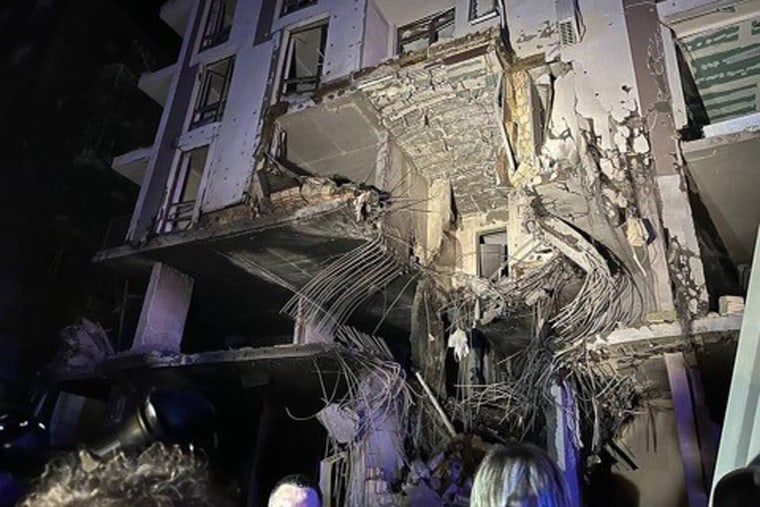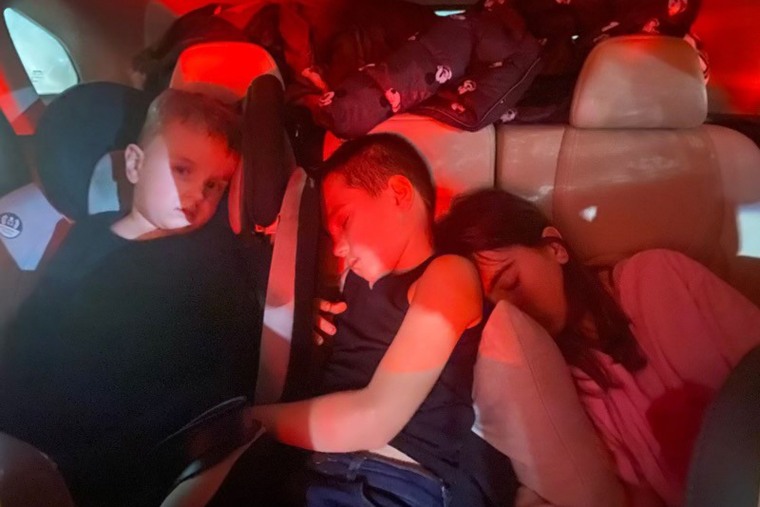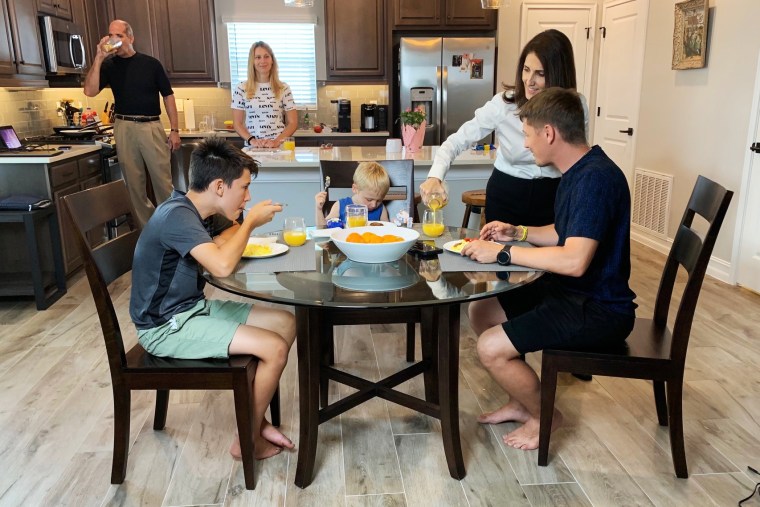TAMPA, Florida — When Roaya and Tony Tyson saw the images in March of Ukrainian families fleeing their homeland, the couple looked around their three-bedroom home in Tampa, Florida, and knew they had to do something.
“Some people were sending money,” Roaya said. “But we wanted to do more.”
After researching online, the Tysons, who have no children, came across the website for Spring of Life, a Ukrainian church based in California’s Sacramento County that’s paired hundreds of Ukrainian families with American hosts.
“We told them we had room in our home for two or three people,” Roaya said. “They told us they had a family of four. We said all righty then — bring them on!”
Two days later, Yuliia Venhlinska and her husband, Serhii Donet, arrived, along with their two sons, Max, 11, and Mark, 3, transforming the Tysons’ once-quiet house of two adults into a bustling home of six.

A 10-minute drive from the Tysons, another Tampa household was also growing. John and Lisa Monaco, both doctors, decided to open the second floor of their home to a Ukrainian family.
Spring of Life Church paired them with Masha and Vladimir Halytska and their three children, Vasilisa, 11, Lev, 7, and Danylo, 3.
“Two weeks ago our house was empty and quiet,” said John, whose youngest child is in college. “Now we have toys and strollers and shoes all over the place. I love it!”
The Tysons and the Monacos opening their homes to Ukrainian refugees are examples of not only strangers helping strangers but also of American hosts and Ukrainian refugees learning to navigate a complicated system of resettlement. Their experiences have in some proved more difficult than recent refugee resettlements in the U.S. and more challenging than many anticipated.
On one hand, the American host families say there have been ample rewards.
“I love having a loud, laughter-filled home,” Lisa Monaco said, noting she has enjoyed teaching Vasilisa to make crafts, and transforming the family’s yard into a soccer pitch for Lev.
“Every night we have a family dinner, all seven of us.
On the other hand, there’s been a mountain of often formidable paperwork.
“It’s not an easy process,” said Roaya Tyson of the experience of helping Venhlinska, Donet, and their children settle into the United States. “It’s been unbelievably difficult. In so many cases, you can’t get one document if you don’t have other documents, so it’s been a catch-22.”
The challenges are not unique, said Chris George, executive director of Integrated Refugee & Immigrant Services, a Connecticut-based refugee resettlement agency.
“Welcoming and resettling refugees or humanitarian parolees is not easy. I can’t imagine an individual or couple doing this without help.”
‘They don’t know what they’re in for’
Under the Uniting for Ukraine program, run by the Department of Homeland Security, up to 100,000 Ukrainians will be able to resettle in the U.S. unders humanitarian parole, which is separate from the State Department’s Refugee Admissions program. Unlike that program, Ukrainians admitted under humanitarian parole will not receive the benefits of refugee status, which include work authorization, health care and housing assistance.
In the fall, 78,000 Afghans came to the U.S. as humanitarian parolees. Congress provided emergency funding for the Afghans to receive medical care, housing allotments and work visas. That kind of assistance has not been provided to Ukrainian refugees.
That means, George said, there is considerable burden placed on individual American sponsors and families who raise their hands to host Ukrainian refugees because they lack the resources of the relief organizations that the government typically calls on to resettle refugees.
“The current system puts too much pressure on the sponsors,” said George. “They’re accepting the pressure willingly, but honestly they don’t know what they’re in for. It’s very time-consuming, all of these necessary tasks, like enrolling kids in school, finding health care, helping somebody find a job, helping them integrate into the community.”
In the case of Venhlinska and Masha Halytska and their families, Susan Morgan, a Florida social worker, volunteered to help. Morgan is serving as a point person for several Ukrainian families resettling in the U.S.
“It’s a lot of responsibility,” Morgan said.
The laundry list of things Ukrainians need to do to get settled is considerable, according to Morgan. Besides state IDs, Ukrainians coming to the U.S. need help in getting driver’s licenses, applying for work visas, seeking out affordable housing, finding schools for children and undergoing physical exams.
Host families and sponsors also need to be mindful, Morgan said, of the trauma the Ukrainians have endured.
“You’re bringing a family in that has left their home, their family,” Morgan said. “They have losses. So as many times people are happy to get here, they’re still experiencing trauma.”
A complicated and unequal process
In the case of the Halytskas, the family was forced to flee their home in Dnipro in the middle of the night, when Russian bombs hit their neighborhood.

“The kids were really afraid,” Masha said. “They could hear the sirens all around them, see the smoke and buildings on fire.”
The family fled with just a pair of bags and a ukulele. They slept in the car for days before making it out of Ukraine.
Even the smallest of children have experienced trauma, said Morgan, who noted Venhlinska’s 3-year-old, Mark, spent his first weeks with the Tysons hiding under furniture, still fearful of Russian shelling.

As challenging as it will be for Ukrainians to resettle in the U.S. in the coming weeks and months, critics have noted they’ve received better treatment in some instances than other refugees seeking asylum here, particularly those at the U.S.-Mexico border. Ukrainians were in many cases able to move to the front of the line.
“It’s not the fault of the Ukrainians that they’ve been at times getting preferential treatment,” George said, noting they’ve received better treatment in many cases than refugees from El Salvador, Honduras and Syria. “We shouldn’t blame them but we should blame people at the border for the way they are forcing other people fleeing dangerous conditions to wait many months under dangerous situations.”
George hopes the United for Ukraine program will implement an orientation and coaching program in the coming weeks to help Ukrainian refugees and host families navigate the resettlement process more smoothly.
“We’ve always believed in the ability of an ordinary American to step forward and welcome refugees, but ordinary Americans need help.”

While they feel overwhelmed at times, for now, Venhlinska and Masha Halytska say they’re happy to have found their way to the U.S.
“We feel safe now,” Halytska said. “Now we can breathe.”
Both mothers are enrolling their children in Tampa-area public schools in the fall and both families are awaiting work visas, which is likely to take months.
“We want to work,” said Venhlinska, who was a chemist in Ukraine.
“We don’t want to be dependent on anybody’s support, even if it’s very helpful,” said Halytska, who worked as a nutritionist in Ukraine and whose husband owned and operated his own trucking company.
Their hosts — one-time strangers they now call family — say, no matter how daunting the resettlement process may be at times, they’re happy to have opened their homes and their hearts.
“I now consider Yuliia a daughter,” Roaya Tyson said.
“It’s really a gift,” agreed John Monaco. “They get to be in a safe home, and we get to feel like we’re doing something in what I consider to be a world war of good versus evil. We feel like we’re the grandparents and the kids and the grandkids have come home.”